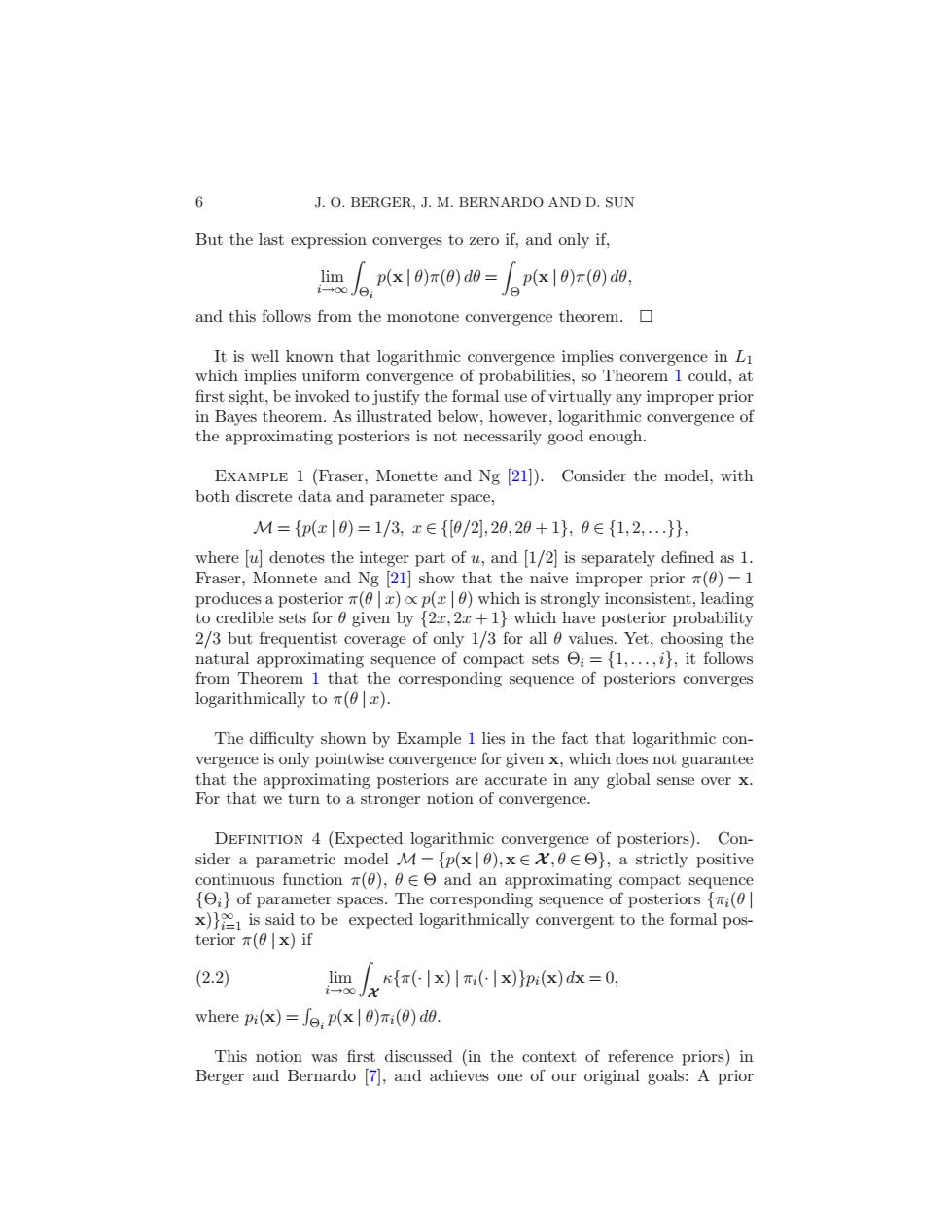正在加载图片...

6 J.O.BERGER.J.M.BERNARDO AND D.SUN But the last expression converges to zero if,and only if, lim p(x|0)π(0)d0=p(x|0)π(0)d0 and this follows from the monotone convergence theorem. It is well known that logarithmic convergence implies convergence in LI which implies uniform convergence of probabilities,so Theorem 1 could,at first sight,be invoked to justify the formal use of virtually any improper prior in Bayes theorem.As illustrated below,however,logarithmic convergence of the approximating posteriors is not necessarily good enough. EXAMPLE 1 (Fraser,Monette and Ng [21]).Consider the model,with both discrete data and parameter space, M={p(x|)=1/3,x∈{0/2,20,20+1,0∈{1,2,}, where [u]denotes the integer part of u,and [1/2]is separately defined as 1. Fraser,Monnete and Ng [21]show that the naive improper prior ()=1 produces a posterior (r)o p(x)which is strongly inconsistent,leading to credible sets for 6 given by [2r,2+1 which have posterior probability 2/3 but frequentist coverage of only 1/3 for all 6 values.Yet,choosing the natural approximating sequence of compact sets e:={1,...,i},it follows from Theorem 1 that the corresponding sequence of posteriors converges logarithmically to (x). The difficulty shown by Example 1 lies in the fact that logarithmic con- vergence is only pointwise convergence for given x,which does not guarantee that the approximating posteriors are accurate in any global sense over x. For that we turn to a stronger notion of convergence. DEFINITION 4 (Expected logarithmic convergence of posteriors).Con- sider a parametric model M={p(x0),xE,0e},a strictly positive continuous function r(0),6ee and an approximating compact sequence {i}of parameter spaces.The corresponding sequence of posteriors {mi( x)is said to be expected logarithmically convergent to the formal pos- terior (x)if (2.2) IimK{π(|x)|π(|x)}p(x)dk=0, i- where pi(x)=Je.p(x0)ni(0)do. This notion was first discussed (in the context of reference priors)in Berger and Bernardo [7],and achieves one of our original goals:A prior6 J. O. BERGER, J. M. BERNARDO AND D. SUN But the last expression converges to zero if, and only if, lim i→∞ Z Θi p(x | θ)π(θ) dθ = Z Θ p(x | θ)π(θ) dθ, and this follows from the monotone convergence theorem. It is well known that logarithmic convergence implies convergence in L1 which implies uniform convergence of probabilities, so Theorem 1 could, at first sight, be invoked to justify the formal use of virtually any improper prior in Bayes theorem. As illustrated below, however, logarithmic convergence of the approximating posteriors is not necessarily good enough. Example 1 (Fraser, Monette and Ng [21]). Consider the model, with both discrete data and parameter space, M = {p(x | θ) = 1/3, x ∈ {[θ/2], 2θ, 2θ + 1}, θ ∈ {1, 2,...}}, where [u] denotes the integer part of u, and [1/2] is separately defined as 1. Fraser, Monnete and Ng [21] show that the naive improper prior π(θ) = 1 produces a posterior π(θ | x) ∝ p(x | θ) which is strongly inconsistent, leading to credible sets for θ given by {2x, 2x + 1} which have posterior probability 2/3 but frequentist coverage of only 1/3 for all θ values. Yet, choosing the natural approximating sequence of compact sets Θi = {1,...,i}, it follows from Theorem 1 that the corresponding sequence of posteriors converges logarithmically to π(θ | x). The difficulty shown by Example 1 lies in the fact that logarithmic convergence is only pointwise convergence for given x, which does not guarantee that the approximating posteriors are accurate in any global sense over x. For that we turn to a stronger notion of convergence. Definition 4 (Expected logarithmic convergence of posteriors). Consider a parametric model M = {p(x | θ),x ∈ X ,θ ∈ Θ}, a strictly positive continuous function π(θ), θ ∈ Θ and an approximating compact sequence {Θi} of parameter spaces. The corresponding sequence of posteriors {πi(θ | x)}∞ i=1 is said to be expected logarithmically convergent to the formal posterior π(θ | x) if lim i→∞ Z X (2.2) κ{π(· | x) | πi(· | x)}pi(x) dx = 0, where pi(x) = R Θi p(x | θ)πi(θ) dθ. This notion was first discussed (in the context of reference priors) in Berger and Bernardo [7], and achieves one of our original goals: A prior�